On the night of October 8, 2017, my life changed forever. A fire swept through the lofty peaks which surround the Napa Valley. There was no time to gather any of my belongings. I simply ran to the car and drove away. My parents and I barely survived. I blamed God – not for causing the fire but for allowing it to devastate my life. When I returned to my parents’ property three days later, during the long ride up the road from the Valley floor, I noticed that some houses and structures survived, and others, just a few feet away, burned to the ground. Why, God? When I saw that my house was gone, I thought, Thanks for nothing.
I was raised in a natural environment of relative peace and tranquility. In the early 1970s, my father inexplicably bought a 40-acre plot of seemingly useless land on a forgotten mountain in Northern California. A few of my father’s relatives thought he was foolish, but slowly he was able to transform the property into a near-heavenly oasis.
My father worked every inch of that land, and the demarcation between what he bought and the bordering lot owned by a neighbor (then donated to a public reserve) was startling. On one side of the fence were carefully shaped and trimmed olive trees, flowering shrubs, and dirt wiped clean of leaves and debris. On the other, even in a populated area extremely susceptible to wildfires, the vegetation was allowed to grow out of control; invasive, non-native, and highly flammable species, such as eucalyptus, were everywhere. Sometimes I would look over into that expanse of fallen trees and sky-high brush and weeds, and think, one day this will all burn us alive.
Yet I can see why so many were incredibly skeptical of my father’s purchase. Covered in manzanita trees and scraggly half-dead bushes, the earth covered in undergrowth and strewn with rocks and massive boulders, it looked like a semi-arid wilderness. Beyond all that, my father could see underneath the bramble directly at the rich volcanic red soil, just waiting to receive and nourish a hardy variety of rootstock. Moreover, I think the surroundings reminded him of his native Sicily. When I traveled there as an adult, it felt oddly like where I grew up – the terrain, the dryness, and the valleys planted with vineyards. I was somewhat home.
When you are surrounded by beauty but your heart and mind are in turmoil, you can’t see anything outside your own inner ugliness. For me, the land that my father transformed represented him in some odd way. The chaotic jumble of meandering branches vanished, and there appeared neat rows of manicured grapevines. Only a man of steadfast courage and tenacity could accomplish such a task. As a kid I longed to be near my father and help him in the garage or help him fix a tractor out in the fields, but I was endlessly awkward and unsure. I was in the way. Instead, I tended toward solitary pursuits of fantasy. I became obsessed with Atari, male superheroes, and pornography. Although my thoughts were often tangled and confused, a strange lethargy endured. I became the odd-looking figure in the eerie painting, Oh, What’s That in the Hollow, by Edward Robert Hughes. While my father remained dynamic, I was almost motionless.
As a teenager, I fled from the bucolic dreamland my dad created. Like the father of the biblical “prodigal son,” he stayed behind, and I went in search of my own Eden. In the gay community of San Francisco, I thought I could discover the tree of knowledge, but the forbidden fruit only offered loneliness, disease, and eventual death. Despite this, I kept trying to feast on the same rotten lies. Then the hunger was more than I could tolerate for another day, so I turned toward home. Immediately, the plentiful land that my father cultivated didn’t look so repressive anymore. Here, I could find healing and serenity.
I remained there until the night it all burned down. Only a small chapel survived untouched. On an expansive property dominated by the vineyards, a large home, and an impressive winery and wine cellar, the insignificant chapel might appear as an afterthought. It was the last building that my father had constructed, but in his later years it was the most personally significant.
As my father grew older, he became less interested in reshaping his surrounding environment and increasingly absorbed with converting himself and his family through prayer, specifically utilizing the power of the Rosary. While much of this took place, I was far away. However, it was my father’s prayers in my absence that eventually guaranteed I would one day return. The small chapel represented his enduring faith and his desire for solitude and stability in a disordered world.
A few days after the fire, I was the first in my family to return to the devastated property. Amidst the tangled pieces of twisted, semi-melted steel and half-burned fragments of lumber, I saw the untouched chapel. The small garden around the building, with the flowers still in bloom, was also largely un-scorched. Standing there, I knew that I had lost everything I had ever owned, but I was calm.
Right after the fire, one of my immediate concerns was where I would live. My siblings were busy housing other suddenly homeless relatives, and I didn’t want to overcrowd their already filled-to-capacity houses. For a few days, a concerned benefactor helped me secure a hotel room. In the hours following the initial conflagration of the fires, finding any local vacancies was almost an impossibility. I was thankful, but the once rather elegant tourist resort morphed overnight into a near refugee center with numerous families, children, and yelping pet dogs crowding every room. I was in shock, and the all-night stomping of children’s feet and the scampering sounds from a troupe of Boston Terriers left me on the edge of collapse. After one night, I had enough.
Nearby, a solitary monastery on a hill is often mistaken by casual visitors as a winery. I first stepped foot on the grounds when I was in second grade. As a special day-long retreat before our First Holy Communion, my teacher arranged for her students to visit the monastery, eat a packed lunch outside near the beautiful oak trees and fountains, and then listen to a short talk from one of the friars. I never forgot it. Having been raised in the post-Vatican II era of religious sisters in sweaters and slacks, and priests who wore turtlenecks and giddily broke into the middle of Mass to invite the children into the sanctuary for the consecration, I hadn’t ever seen a habit or listened to someone who embodied a sense of quiet. Even at that young age, I left fascinated. This place was different, as were the men.
Above the monastery is a vast stretch of beautifully wooded mountains, thickly covered in pine and redwood. Since returning to Catholicism, I often visited the place and thought of it as a refuge. For example, on a weekday, the friars offered the Sacrament of Confession to the public, often with hours running into the night. When I was new to sexual sobriety, I sometimes became anxious and desperate, and occasionally slipped back into a regimen of daydreams and masturbation. Afterwards, an overwhelming spirit of isolation and failure oppressed me; however, instead of giving up, I would get in my car and drive the short distance to the monastery.
Consequently, I at once thought of the monastery as a possible shelter during my homelessness. They agreed to let me stay. Although spreading wildfires continuously grew and surrounded the region, causing the air to become thick and heavy with smoke, I somehow knew that I would now be safe.
Even before the 2014 earthquake, from which the monastery suffered substantial damage, the friars struggled to sustain the maintenance of the massive building and property. By the time I arrived during the fires, the hermitage and guest rooms – situated in a couple of separate structures not far from the main house – were in need of repair from disuse. But I didn’t care. I set about clearing away the cobwebs, dusting off the shelves, and sweeping up the mouse dirt. A few days before the fire, such conditions would have horrified me, but I knew that the friars were dealing with the same issues in their own quarters, so I was thankful. If they could manage with these inconveniences and daily ordeals, so could I.
I spent a single night in one of the guest rooms, and the next day I was evacuated again due to an encroaching fire that made its way over the adjoining mountain, quickly burning down the hillside directly toward the monastery. I returned to the overcrowded hotel and the incessant noise. The friars went to a nearby monastery.
Since the fire, I wasn’t praying – at all. I didn’t even think of God, except to occasionally curse Him. As far as I could tell, for some reason He had abandoned me, but I didn’t spend much time pondering my possible loss of faith; I was too tired to think. My days were predominantly spent in the hospital where my father convalesced after our dramatic flight from the flames. I had to force myself to eat. I didn’t sleep much. For a few days, the only consideration I gave God was this particular ultimatum: “If you care about me at all, make it so I don’t wake up in the morning.” But I did. For a few brief startling moments, I contemplated returning to San Francisco and going back to my old life – because what had my conversion brought me? At least amongst gay men, there was comradery, always a place to go and be with others, and a warm set of arms to envelop you. For all its terrible excesses, I remembered how the community rallied and stood by its own when so many were struck down by a mysterious plague. When I lost everything in the fires, countless Christian men and women offered their prayers and their financial support, but returning to homosexuality guaranteed that I wouldn’t physically be alone. Right then, a prayer from someone far away seemed pretty nebulous; a body was nearby that I could touch with my hands.
For some reason, before going to bed every evening, I managed to recite a prayer to St. Joseph, a saint to whom my father had always maintained a strong devotion. I remembered that Joseph, too, had to flee in the middle of the night with nothing. He obeyed and remained faithful. I couldn’t.
After about a week, the fires eventually subsided. Although the flames moved dangerously close to the monastery, it was unharmed. I returned. In my absence, nothing had changed. And although the design, decorations, and fixtures at the hotel were of superior class, I curiously longed to return to the old, drafty, and creaky hermitage.
Being a Christian was much more difficult than being gay. Even during the height of the AIDS epidemic, there persisted an odd collective confidence in the shared belief that homosexuality was the only coherent answer to the heartache and turmoil of our childhood. To abandon it, meant that everything we suffered counted for nothing. It also meant that we would have to go back to what we were before – the lonely, scared little boys. It was too late, though; I was already scared, but I wasn’t alone.
Every morning, even though I didn’t want to go, I walked up a long flight of outdoor concrete stairs that led straight to the monastery and the adjoining chapel. At first, I thought that out of gratitude toward the friars, I must attend daily Mass. Most of the time, I sat in the corner and didn’t receive Holy Communion.
After leaving homosexuality, I was hurt and suspicious. My first few ventures back into a Catholic Church were similar to scouting missions in which I sat back and observed. Then, in 1999, I was mainly struck by the utter lack of seriousness during Mass – the bored-looking, lackadaisical priest or his polar opposite, the pastor as hyper-enthusiastic entertainer on a stage overflowing with female co-stars, including numerous extraordinary ministers, lectors, and choir members, with those in the sanctuary often outnumbering the predominantly senior citizen faithful in the pews. Thankfully, the monastery was nothing like that. The priests were near my own age, and, recently appointed to their new assignments, they were extremely reverent during Mass, and their homilies might have changed the course of my entire life if I had heard them when I was a teenager. Because as a boy in the 1970s, the truth only existed within your personal conscience. The Church could uphold certain teachings on account of tradition, but it should never propagate a single interpretation. Also, like the friar from my pre-First Holy Communion retreat, these young friars continued to wear the habit; that cloth mantle was not just an empty gesture to custom, but an outward sign of their orthodoxy. They were living examples of what Christ taught, embodying the Gospel message of love based on honesty and truth – never ceasing to welcome the sinner and then guiding them toward a new life of hope and redemption.
In addition, growing up in Catholic schools, my image of the priest and any male member of a religious order usually consisted of an elderly man, typically with an Irish accent, completely aloof and disinterested, or overly ingratiating to the point of being creepy, almost verging on lecherous. It’s a difficult balancing act for anyone in the religious life, especially the priest, to remain separate but to always stay approachable.
The friars at the monastery are striking to someone from my generation, because they, too, are from my generation. To the single chaste man, such as myself, their witness serves as a great model of chastity – a man can be celibate, energetic, and young, but also masculine. That holiness isn’t something just for women. I first realized this when I began (two decades earlier) to attend the Traditional Latin Mass, also known as the Tridentine Mass.
Frustrated with the constant repetition of the songs written by the St. Louis Jesuits, homilies consisting of yesterday’s golf scores interspersed with lame jokes, and all the hand-holding and hand-shaking – one priest insisted on everyone greeting each other at the beginning of Mass, shaking hands and embracing at the sign of peace, and then offering those around you a formal goodbye before the final blessing – I almost gave up being a Catholic until a marginalized traditionally-minded priest invited me to attend a Latin Mass. At that time, it was a peculiar affair, with the Mass offered at an inconvenient time of day, usually sandwiched between other Masses on Sunday at a parish that somewhat begrudgingly tolerated the mix of oddballs who attended, such as young single men, a few older couples, and numerous families with multiple children – the demographics not typically seen at church. Here, especially with the men, endured great dedication and vitality. I couldn’t believe it. The same sort of strong masculine Catholicism resided within the friars who took in the homeless wastrel. I couldn’t help but recall St. Joseph. These men were stalwart, surefooted, and often silent. This characteristic unwavering discipline I also recognized in the Liturgy.
Since my conversion, I constantly notice that the best Christians inspire less through their words and more by example. This is especially true with men in the Western world where there are often few, if any, venues to publicly express religious devotion. Sometimes at Mass I sit toward the back of the church and look in awe as a young father listens attentively to the Gospel; his very young son, sitting on his father’s lap, squirms for only a couple of seconds, and notices his dad sitting up perfectly straight. The father lightly strokes the boy’s head, and the child turns toward the priest and miraculously listens. The best parents, and the most effective teachers, have an extraordinary power to almost instantaneously pacify a raucous group of children. It is usually those who never raise their voices who elicit the greatest respect. Their power to secure admiration originates in an inner conviction. The friars have this quality as well. I watched them as they walked into the chapel while preparing for Mass, their conscientious attention to the rubrics of the Liturgy, the little things such as how they hold their fingers together when handling the consecrated host, and as they walked out of the chapel after Mass. There is a precision but also an ease of movement. This is a cadence I have observed typically with priests who solely celebrate the Latin Mass, but it is also present in others. Watching them made me want to have confidence in God again, as if I were beholding St. Joseph lead the donkey carrying the Virgin Mary and the Christ Child into Egypt. In the midst of chaos, they have peace and institute order. They were men of action, working at fixing up the damaged monastery, who did not exude any type of frantic restlessness. Nearby, I could not move a single muscle. I dreamed of escape back in San Francisco, but I knew I would never have lasting contentment if I returned. In male homosexuality, a gathering of gay men was like wandering into a swarm of panicked butterflies. There was constant motion but no progress. There is a false sense of order, but confusion reigns.
However, these good men, these ordinary men, who not unlike myself – trying to be holy. Suddenly, I wanted to try as well.
I spoke with the friars a few times during my stay on the monastery grounds, and, although we never formally talked about religious matters or questions, these men inspired me. They inspired me through their daily dedication to their vocation and to God.
I wondered why I was there. Later, I understood. God placed me at the monastery so those men, through their example, could save me from losing my faith.
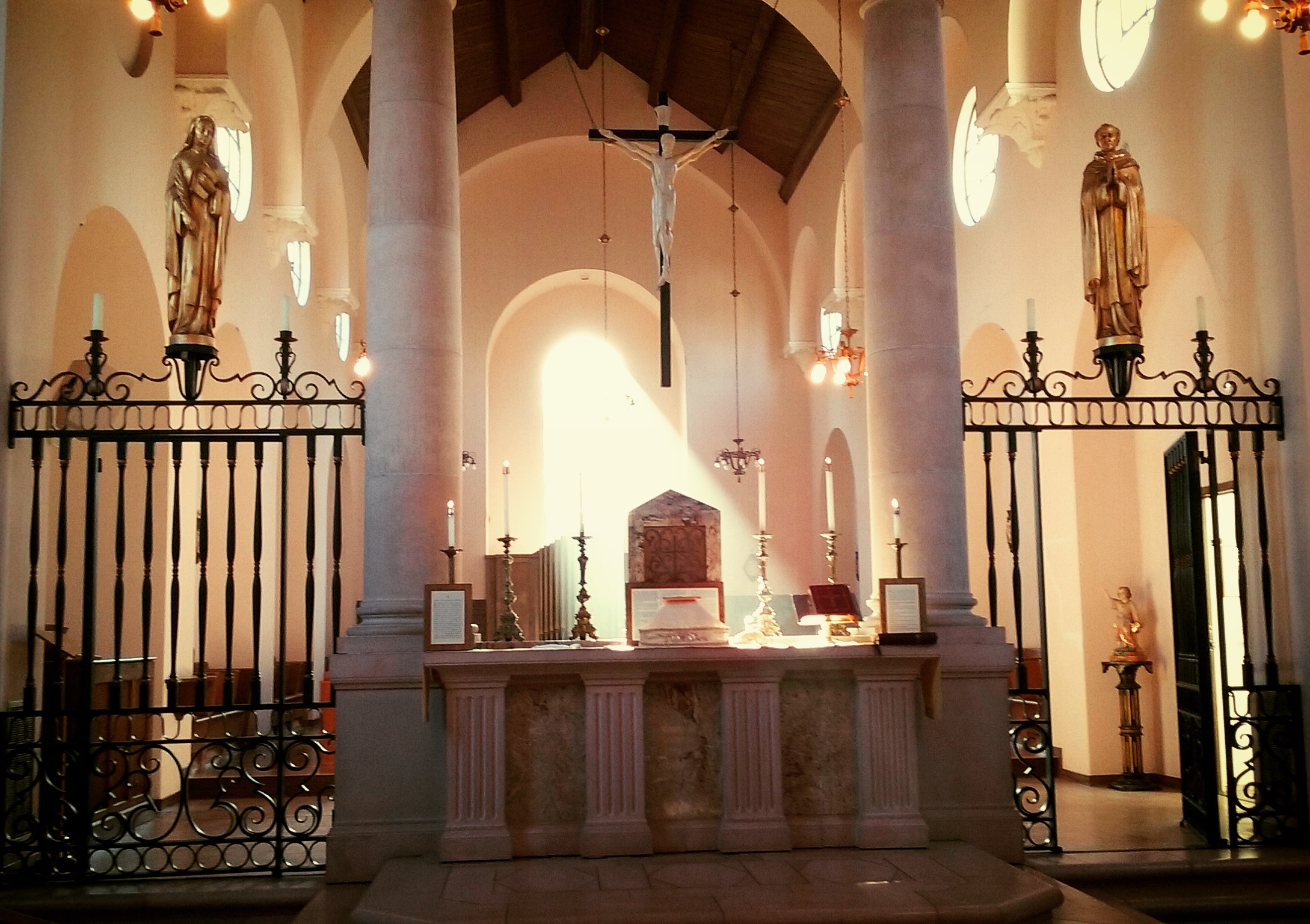
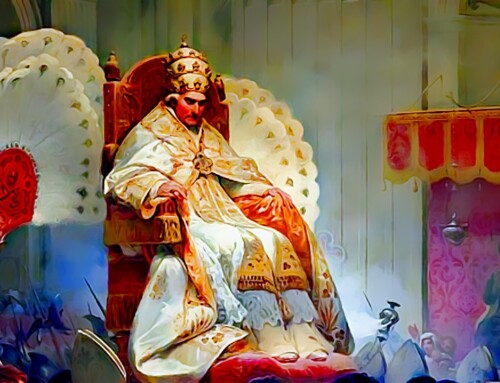
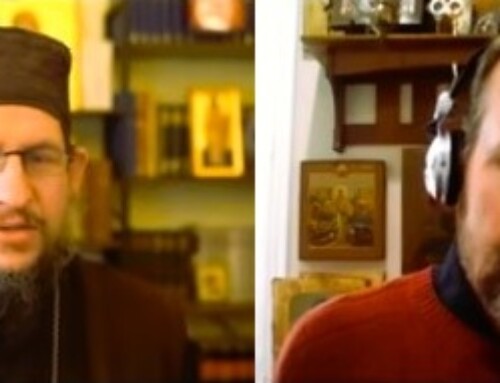
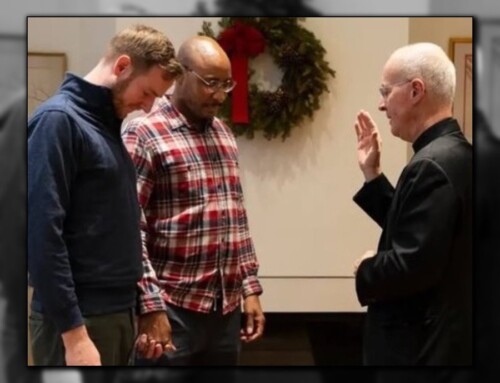
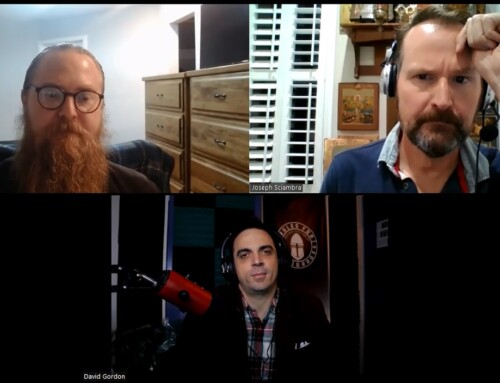
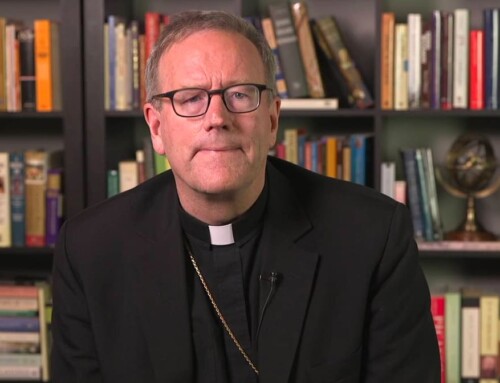
I see another book in the future? I’m a novice to this. That’s what I see. Let God guide this one for you. Blessings.
Hi Joseph,
Thank you for your witness to the Truth of God’s love for us, which is not easy!
I was wondering if you would post the address of the Monestary? I would like to make a Christmas gift in your name.
Fr. Ron
Carmelite Monastery
P.O. Box 347
Oakville, CA 94562
God brought you there to save your faith, so that my faith would be saved as well.
The flames in my life are not the same but they brought me to the same conclusion. I can not go back. I want to go back, the loneliness, desolation that I am experiencing now is so overwhelming that I daydream of times before my conversion, when I could seek comfort in the human ecperience.
I cannot go back. I know the love of God, though I doubt it often. I feel that some how I am not worth His time and love. I know the truth of God, though I try to get around it at times. I can not go back.
As I sit here, with my tear stained face, reading of your trials. I know that God put you in my life, two days before you lost everything. I’ve begun following you, through your blog, the messages you have posted. I have felt a lose when you were with your father or struggling to find shelter and did not have time for posting on Facebook.
We may never meet, but our most precious God, knew you were the voice that could lead me through the trials of my life.
I thank you. I praise God for you. I pray that you will find the strenght to continue. Our paths may not be the same but your struggle and faith give me strenth to take one more step, trust for one more second.
God bless your and your family.
Terri
I missed your writing. I had no idea your family was affected by the fires. I am so sorry. My community has been dealing with Hurricane Harvey-48% of our neighborhood was flooded.
Is there a way your readers can help with a financial donation? Please let us contribute. You enrich our lives with your blog, we would like to help you out in your time of need.
Thank you Joseph for your honesty. May God continue to strengthen you through this trial. You will only know at the end of your life, all the people you helped to save from the ordeals, you have had in your life by sharing your stories. Please tell us where we can send you something for Christmas.
Thank you for being so real, so raw. It is so helpful to those who are also walking along His path of the Cross.
Hi Joseph, my brother-in-law is giving a talk to the bishops in northern Wisconsin on the topic of homosexuality. I sent him your blog and he immediately bought your book. You do amazing work. Your podcasts are beyond fascinating and your blog posts are like poetry. I was particularly touched by the one where you described your masculine 8th grade teacher who ended up getting sick but had a profound effect on you. It was like a condensed autobiography. Astoundingly well written. I just wanted you to understand the tremendous impact you have and thank you for your honesty!
Hi Joseph,
This is an amazing story. I had no idea you and your parents suffered devastation from the fires. That is a very hard bump in the road….Wow. I have been inspired by St. Joseph to pray in a special way for you and your parents & siblings. I have a great devotion to St Joseph. St. Joseph saved you in a special way at the monastery — maybe from committing mortal sins of impurity by going back out so to speak. You are so special and your testimony is very powerful. Please stay very close to St Joseph & the rosary —– and Jesus at Daily Mass. Satan would love to swallow you up again….don’t let Satan win by tempting you to despair. God Bless you Joseph! Stay Strong! We need you and love you!
I sensed there was something serious going on from the dearth in posting. Prayers were offered for you. Let us all hold fast to Christ despite what is thrown at us and turn it to God’s glory.
Dear Joseph, so sorry you had to experience this raumatic event, but thak God for His grace that you did not lose your life, nor your faith. When Jesus is all you have… you see that He really is all you need. and the Source of every good thing.
May He restore to you hundred-fold all you have lost, and may He fill you with His deep sense of peace in the middle of this crazy world.
Wonderful story, everyone who doubts the existence of God being a real presence in our lives.Should read this story and rethink their beliefs.You were truly touched by God Joseph,He truly wants to show you the love He has for you and everyone else